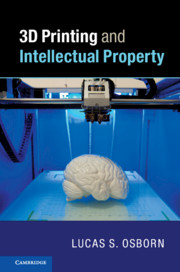3D Printing and Intellectual Property
£34.99
- Author: Lucas S. Osborn, Campbell University, North Carolina
- Date Published: September 2019
- availability: In stock
- format: Paperback
- isbn: 9781316605349
£
34.99
Paperback
Other available formats:
Hardback, eBook
Looking for an inspection copy?
This title is not currently available on inspection
-
Intellectual property (IP) laws were drafted for tangible objects, but 3D printing technology, which digitizes objects and offers manufacturing capacity to anyone, is disrupting these laws and their underlying policies. In this timely work, Lucas S. Osborn focuses on the novel issues raised for IP law by 3D printing for the major IP systems around the world. He specifically addresses how patent and design law must wrestle with protecting digital versions of inventions and policing individualized manufacturing, how trademark law must confront the dissociation of design from manufacturing, and how patent and copyright law must be reconciled when digital versions of primarily utilitarian objects are concerned. With an even hand and keen insight, Osborn offers an innovation-centered analysis of and balanced response to the disruption caused by 3D printing that should be read by nonexperts and experts alike.
Read more- Elucidates the novel legal issues raised by 3D printing technology so that readers can understand where new legal strategies or changes in doctrine are most likely needed
- Provides a strong emphasis on utilitarian innovation as it relates to 3D printing to reveal issues not affected or analyzed during previous rounds of digitization (such as those involving music, movies, and books)
- Written in a manner accessible to non-lawyers and non-IP experts to allow a broader audience to understand the impact of the technology on IP, innovation, and creative endeavors
- Includes analysis of several of the major IP systems around the world, notably the US, Europe, and Japan, in order to make analyses and conclusions relevant to a global audience
Reviews & endorsements
'With great clarity, Lucas S. Osborn skillfully delineates a normative intellectual property discourse operating in a broad social policy context. He proposes a sound, holistic approach to innovation policymaking in response to the complexities introduced by 3D printing technologies.' Phoebe Li, University of Sussex
See more reviews'Lucas S. Osborn is a leading scholar on the implications of 3D printing for intellectual property theory and practice. No other scholar has addressed as wide a range of issues across the many areas of intellectual property, and this book synthesizes years of his careful and thorough work. It's a must-read for anyone working on issues relating to this cutting-edge technology.' Mark P. McKenna, John P. Murphy Foundation Professor of Law, University of Notre Dame, Indiana
'Lucas S. Osborn provides a nuanced conceptual framework to begin any analysis of the interaction between 3D printing and intellectual property law. He also articulates the most precise description I have read of how copyright law interacts with 3D files for useful objects. Highly recommended for anyone searching for a sophisticated accounting of where 3D printing could actually disrupt intellectual property law.' Michael Weinberg, Executive Director, Engelberg Center on Innovation Law and Policy, New York University
'Does the uptake of 3D printing challenge prevailing concepts of patentable subject matter and current patentability requirements? Does 3D printing fundamentally alter the scope of rights and the concepts of direct/indirect infringement? Approaching these themes with legal rigor and bold originality, Lucas S. Osborn provides an exciting journey with well-founded answers and invites readers to look beyond the traditional limits of patent law.' Geertrui Van Overwalle, Katholieke Universiteit Leuven, Belgium
'Lucas S. Osborn brings important intellectual leadership to the law of 3D printing in this ambitious and groundbreaking study. His comprehensive yet straightforward discussion makes a topic saturated with cutting-edge technology and legal nuance remarkably accessible. An engaging read for lawyers, innovators, and technophiles alike.' Daniel Brean, University of Akron, Ohio and The Webb Law Firm
'This timely book walks us through the maze of intellectual property law and policy surrounding the digital marvel of 3D printing, and helps us to understand that the future is now. A must-read for technologically curious and forward-thinking lawyers and policymakers as well as designers and artists.' Nari Lee, Hanken School of Economics, Helsinki
'Lucas S. Osborn's fascinating new book demystifies 3D printing and explains why this technology is having positive disruptive effects in many industry sectors. The future is bright and the technologies are evolving rapidly, but can intellectual property laws quickly adapt to appropriately regulating digital files that can be transformed into physical goods and back again? Osborn explores the myriad mysteries that 3D technologies pose for conventional IP regimes and how those mysteries should be resolved to promote the public good.' Pamela Samuelson, Richard M. Sherman Distinguished Professor of Law and Information, University of California, Berkeley
'This timely and accessible book examines the myriad legal challenges brought about by the latest disruptive technology. It underscores the importance of doctrinal clarity in intellectual property law while calling for a holistic optimization of innovation incentives. Whether you are familiar with 3D printing or not, this highly recommended book will provoke you to rethink the complex interrelationship between law and technology.' Peter K. Yu, Texas A & M University
'There is little written on this particular subject, so 3D Printing and Intellectual Property would be an excellent addition to a library with a focus on intellectual property materials.' Susannah Tredwell, Canadian Law Library Review
Customer reviews
Not yet reviewed
Be the first to review
Review was not posted due to profanity
×Product details
- Date Published: September 2019
- format: Paperback
- isbn: 9781316605349
- length: 242 pages
- dimensions: 228 x 152 x 15 mm
- weight: 0.36kg
- availability: In stock
Table of Contents
Introduction
1.3D printing technology's capabilities and effects
2. How 3D printing works and why it matters
3. Primer on intellectual property law
4. Can you patent a 3D printable file? (And why it matters)
5. Patents – direct infringement, individual infringement, and 'digital' infringement
6. Patents – indirect infringement and intermediaries
7. 3D printing and trademarks: the dissociation between design and manufacturing
8. Creativity and utility:
3D printable files and the boundary between copyright and patent protection
9. Design rights, tangibility, and free expression
10. DMFs and optimizing innovation incentives
Conclusion.
Sorry, this resource is locked
Please register or sign in to request access. If you are having problems accessing these resources please email [email protected]
Register Sign in» Proceed
You are now leaving the Cambridge University Press website. Your eBook purchase and download will be completed by our partner www.ebooks.com. Please see the permission section of the www.ebooks.com catalogue page for details of the print & copy limits on our eBooks.
Continue ×Are you sure you want to delete your account?
This cannot be undone.
Thank you for your feedback which will help us improve our service.
If you requested a response, we will make sure to get back to you shortly.
×




